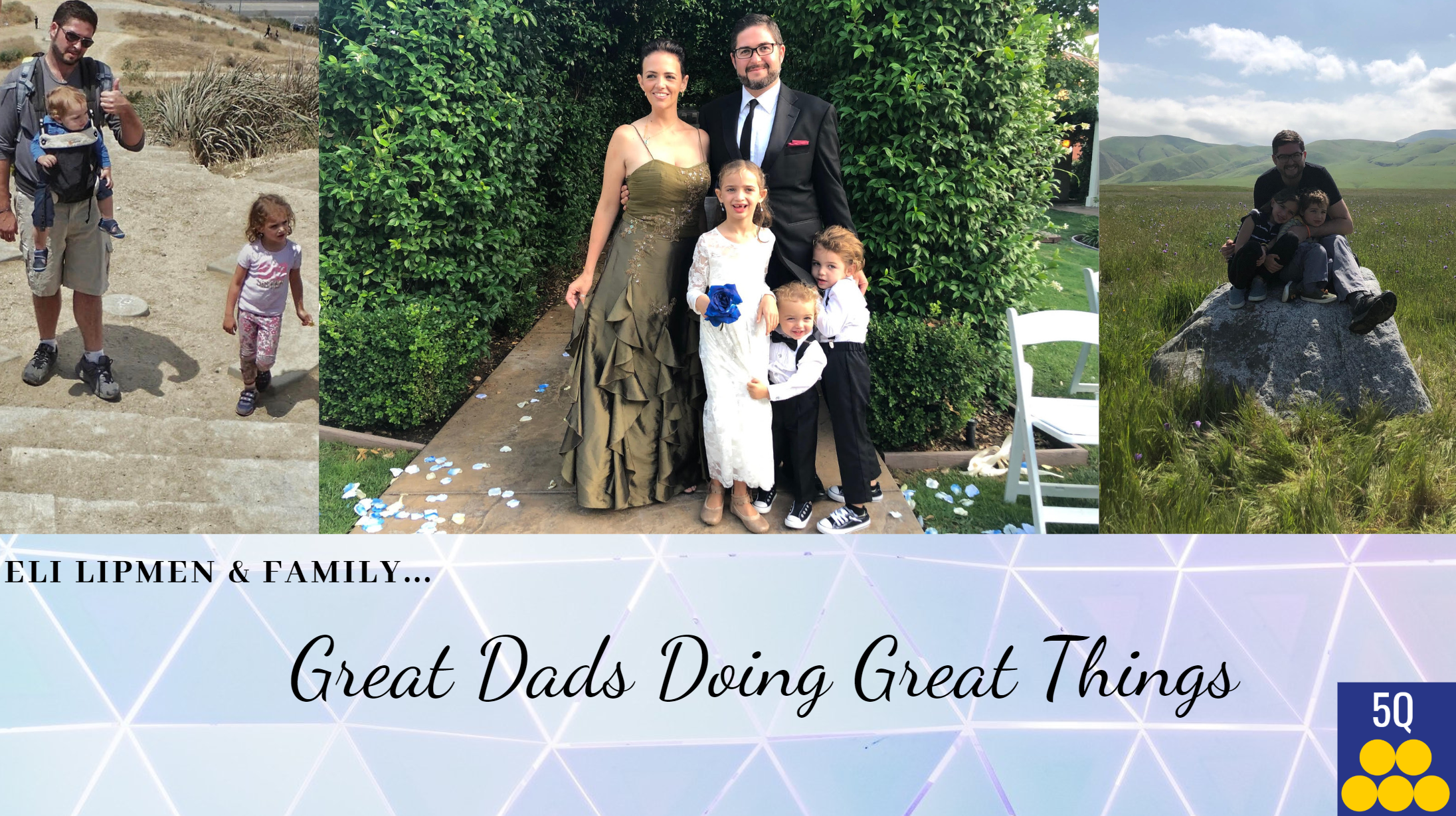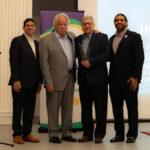Five Questions (5Q) With…

Eli Lipmen
Featured in The Honor Project Documentary – a powerful and inspirational piece about dads “leading from the front” and making a profound difference in their children’s lives and the world at large – Eli Lipmen has always put “Dad” at the top of his list of important jobs and accomplishments.
In addition to his role as “Dad,” Eli serves as an instructor for American Jewish University, is a member and blog editor for City Dads Group, deputy director for Move LA and president and volunteer commissioner for the City of Los Angeles Neighborhood Council System, one of the largest grassroots democracy systems in the country.
1. What is the biggest lesson you have learned from the City Dads Group and from being a dad, overall?
For all the books and blogs out there, I have found that there is no one “right way” to be a dad. Everyone raises their kids in their own unique way and while we can learn from each other, we can’t replicate what others have done, nor should we. The reason that parenting is so magical is it is a unique experience for each person and I love reading about other fathers’ journeys through fatherhood.
Personally, I went from working full-time to being at home full-time, to then going back to work full-time and now back to being an at-home dad. Essentially, every parent is now “at home” and so we have become full-time caregivers, cooks, teachers and then some for our kids…while also trying to make an income. This is an incredibly challenging time to be a parent but also an opportunity like no other to spend quality time with your family. There are some great stories out there including the Honor Project Documentary (featuring me!), written pieces by my fellow City Dads Group bloggers, how-to videos “for dads, by dads,” stories on the importance of paid paternity leave from Dove Men+Care and even parent parody accounts like the Holderness Family on YouTube and @XplodingUnicorn on Twitter. The City Dads Group is also an opportunity to share resources on teaching children to be good citizens by talking to them about systemic racism and inequality as well as the importance of elections, protests and public health. For instance, I have written about protesting and voting together as a family, and we are working to amplify the voices of Black creators—writers, artists and content producers who are telling their stories of fatherhood like Beleaf in Fatherhood, Doyin Richards and Tshaka Explains It All. By telling and sharing stories of fatherhood, we can feature the additional challenges faced by many Black fathers while also showing that dads ultimately share in the same struggles with their kids.
2. When did you know you wanted to be a change agent and what/who inspired you?
I remember attending a candidate forum when I was eight years old and challenged the candidates with a question. Since then I have always worked to be an agent of change. In college, I worked on an education campaign around student debt and my first job in the nonprofit sector focused on international human rights abuses, immigration reform, anti-Semitism, genocide, energy security and all forms of hatred against minorities. Since then, I have worked on food security, parental leave and internet, healthcare and public transit access. My wife Sara-Jean, who is fondly known as “SJ,” has always been my inspiration to “repair the world” (the English translation for the Reform Judaism concept of tikkun olam). Not only am I inspired by her own work to change education but she has always supported me when taking on leadership roles in the community. Through my work with the City of Los Angeles Neighborhood Council System, as part of EmpowerLA, we have led innovations in government including an online voting system and enfranchisement of undocumented immigrants and youth between the ages of 14 and 17, providing them a formal opportunity to engage in local government. We also just launched a completely virtual public meeting system available to all 99 neighborhood councils in the City of Los Angeles in a matter of weeks, and are now working on addressing funding and other inequities in our system to help empower marginalized communities.
3. How do you see cause marketing changing/evolving in the next decade and do you see the current world issues shaping this evolution?
I teach two courses—one on social innovation and advocacy and another on cause marketing—to nonprofit MBA candidates in a unique program at American Jewish University in Bel Air, California. I am inspired every semester by the passion and creativity of my students in developing their advocacy and communication campaigns. There will be both opportunities and pitfalls for cause marketing as we are all shaped by the events of the past few months. We are already seeing opportunities for cause marketing campaigns due to the global pandemic; for instance, my students saw an opportunity to increase the fostering of pets as companions during stay-at-home orders and raise awareness about the issue of euthanasia, generally. The pitfalls are many, particularly on the issue of race and racial justice, where I believe many nonprofits and businesses have failed to advance these important issues effectively. There needs to be a real honest conversation in the nonprofit sector about the role it plays in hiring Black, Indigenous and People of Color and how it invests in marginalized communities in a way that is sensitive to further marginalization. A good place to start is this series of articles in the Stanford Social Innovation Review on Breaking Through Barriers to Racial Equity. Cause marketing will play a critical role in framing this conversation and ensuring real societal change.
4. It is still early, but how do you think COVID-19 will change the world of nonprofits and fundraising strategies?
It already has. Gone are the days of gala dinners and coffee meetings. Contributions to incredibly well-endowed educational nonprofits or hospital systems with billions of dollars in revenue call into question the nonprofit sector as students struggle to pay debt, people who contracted coronavirus are left with thousands of dollars in medical bills and low-income households face eviction and homelessness. COVID-19 will fundamentally change how the sector raises and spends funds. First, it will expose the fact that most nonprofit budgets are actually used to pay the incredible people who dedicate their lives to serving others. In my opinion, these dedicated nonprofit leaders deserve a salary and benefits that mean they can afford to have quality healthcare, a home of their own and a family (if they choose). It is also my hope that more women and minorities are hired and work in leadership positions at nonprofits. Second, we will see a fundamental re-orientation of the relationship with donors. My friend and philanthropist Lisa Greer wrote a book (pre-COVID-19) called the Philanthropy Revolution on saving philanthropy by focusing on inspiring donors and building real relationships. Finally, we will likely see a number of nonprofits either fail to survive or seek to merge with other like-minded organizations. This should be embraced as some organizations have drifted far from their original mission while others have formed without consideration for the good work already being conducted by similar nonprofits. As explored in McKinsey & Company’s A Transformative Moment for Philanthropy, from this crisis comes an opportunity to reshape and strengthen priorities and practices for the next era of giving, including collaborative partnerships and merged efforts.
5. Best advice you were ever given and advice you might have for organizations?
My second boss and mentor once said, “Don’t peak too early.” Don’t try to climb too high too quickly up the employment ladder. Experience is important for leadership and that takes time. So my advice is don’t promote or ask to be promoted too quickly; retain great staff, cultivate them for leadership but wait until they show they are ready to lead.
Bonus Question: What/Who is keeping you “sane” these days as we acclimate to our new normal?
We had a bread maker and ice cream maker in a box for several years, taking them out only when we felt inspired. Now we make fresh bread and ice cream regularly, including our own challah for Shabbat. The kids like to participate in the process which is part of the fun (and learning). We also got the kids a bouncy house, a good investment to get them outside and active. For me and my wife, we always talked about growing our own food, but never did. Now, we finally have an active garden with vegetables and herbs and we are looking forward to growing fruit next.





